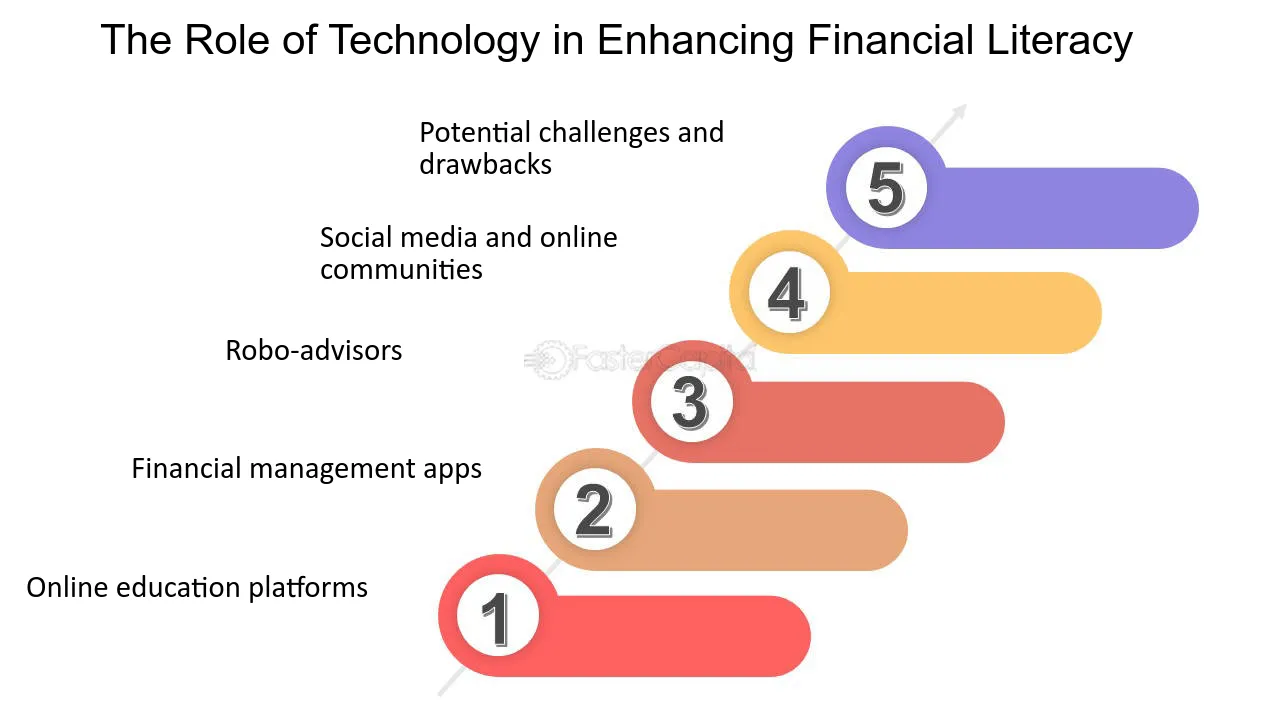Financial Literacy Essentials: Must-Know Concepts for B.Com Students
Table of Contents

- jaro education
- 9, April 2024
- 2:00 pm
Financial literacy is the ability to understand and effectively manage various financial aspects, including budgeting, investing, saving, borrowing, and planning for the future. It encompasses having the knowledge and skills to make informed financial decisions, evaluate financial risks, and navigate financial systems confidently.
Financial literacy is an essential skill set for individuals venturing into the business and commerce sectors. For B.Com (Bachelor of Commerce) students, gaining a solid understanding of fundamental financial concepts is not only crucial for academic achievement but also for effectively navigating personal and professional financial decisions. In this detailed exploration, we will delve into the must-know concepts of financial literacy that every B.Com student should familiarize themselves with. This knowledge will not only contribute to their academic success but also prepare them for success in their future careers in the business world.
In this blog, we’ll delve into the must-know concepts of financial literacy that every B.Com student should be familiar with.
Importance of Financial Literacy for B.Com Students
Financial literacy extends far beyond mere arithmetic proficiency. It involves a comprehensive grasp of diverse financial facets crucial in both personal and business financial realms. For B.Com students, cultivating financial literacy is paramount as it enables them to:
1. Manage Personal Finances
Mastering financial literacy equips B.Com students with indispensable skills for effective personal financial management:
- Budgeting: Learning how to create and maintain budgets enables students to allocate funds sensibly across expenses, savings, and investments.
- Expense Management: Understanding expenditure tracking, distinguishing between needs and wants, and making informed spending choices contribute to financial stability.
- Saving and Investing: Proficiency in saving regularly and making informed investment decisions fosters wealth accumulation and goal achievement.
By honing personal financial management skills, B.Com students lay a solid groundwork for financial security and cultivate responsible financial habits early on.
2. Scale up their Career
Financial acumen is highly prized in the competitive business arena, offering several advantages to B.Com students:
- Financial Statements Analysis: Proficiency in analyzing financial statements like balance sheets and income statements enables students to evaluate a company’s financial performance accurately.
- Data-Driven Decision-Making: Proficiency in data-driven decision-making, including the analysis of financial data, trend identification, and leveraging data for informed decisions, significantly enhances students’ expertise and marketability in roles related to finance, accounting, and business analysis.
- Strategic Decision-Making: Making informed decisions based on financial insights showcases critical thinking and enhances students’ credibility in strategic decision-making processes.
Employers actively seek candidates with robust financial literacy skills who can contribute meaningfully to financial planning, budgeting, and strategic decision-making, thus creating abundant career advancement opportunities for B.Com graduates.
3. To Become an Entrepreneur
For B.Com students aspiring to entrepreneurial ventures, financial literacy is indispensable for several reasons:
- Business Planning: Proficiency in financial concepts like revenue projections and cost estimation is crucial for developing comprehensive business plans.
- Cash Flow Management: The strategic management of cash flow stands as a critical factor in sustaining and expanding businesses. With a strong foundation in financial literacy, entrepreneurs can adeptly monitor cash flows, proactively plan for contingencies, and optimize their financial resources for long-term growth and stability.
- Risk Management: Identifying and mitigating financial risks, such as market fluctuations and credit risks, is essential for entrepreneurial success. Financial literacy empowers entrepreneurs to make informed risk management decisions.
By mastering financial literacy, B.Com students gain the expertise necessary to navigate the intricacies of entrepreneurship, make strategic financial decisions, and build resilient businesses.
Understanding the importance of financial literacy for B.Com students underscores the value of a comprehensive education that prepares individuals for real-world financial challenges. Bachelor of Commerce (BCom) Program – offered by Amrita Vishwa Vidyapeetham is meticulously designed to equip students not just with theoretical knowledge, but also with practical financial skills crucial in today’s economic landscape. Through a curriculum that emphasizes personal financial management, career advancement, and entrepreneurship, the program aims to mould individuals into financially literate professionals capable of making informed decisions across various financial contexts.
Must-Know Financial Concepts for B.Com Students
Here are the must-know financial concepts that are essential for B.Com (Bachelor of Commerce) students:
Budgeting and Financial Planning
Mastering budgeting and financial planning is fundamental for B.Com students. Creating a budget entails identifying income sources and allocating funds for expenses, savings, and investments. Prioritizing essential expenses, allocating funds for short-term goals such as vacations and long-term goals like retirement planning, and setting SMART financial goals are crucial aspects of effective financial management.
Allocation of funds requires wise decision-making to ensure financial stability and wealth creation. B.Com students should allocate a significant portion of their income to cover essential expenses like housing, utilities, groceries, and transportation. Setting aside funds for savings and investments helps in building financial security and achieving long-term financial goals.
Financial goals act as a roadmap, providing direction and motivation in financial planning. By setting clear goals, such as saving for education, buying a house, or retirement, students can stay focused and disciplined in their financial decisions.
Banking and Financial Institutions
Understanding banking and financial institutions is paramount for B.Com students as they navigate the complexities of financial management. This knowledge encompasses a range of essential aspects: Firstly, students must grasp the diverse array of banking services available. These services include savings accounts, which provide a secure place to store funds while earning interest; checking accounts, designed for daily transactions such as bill payments and purchases; and investment accounts, which offer opportunities to grow wealth through investments like mutual funds or stocks. Understanding these services empowers students to make informed choices based on their financial goals and needs.
Secondly, knowing the distinctions between various types of accounts is crucial. For example, understanding the features of savings accounts, such as interest rates, minimum balance requirements, and potential fees, enables students to select accounts that align with their financial preferences and objectives. This knowledge helps them optimize their savings and investment strategies for maximum returns and financial stability.
Lastly, making informed decisions about financial products such as loans, credit cards, and investment instruments requires a deep understanding of their terms, benefits, and potential risks. Students need to consider factors like interest rates, repayment terms, fees, rewards, and associated risks when evaluating these products. This comprehension empowers students to choose the most suitable financial products, manage debt responsibly, and make sound investment decisions to achieve their financial aspirations.
Investment Basics
Exploring a range of investment types, such as stocks, bonds, mutual funds, and real estate, empowers students to diversify their investment portfolios. Diversification is essential as it spreads risk across different assets, reducing the impact of potential losses on overall investment performance. Students develop
the ability to balance risk and return by comprehending the unique characteristics and potential rewards associated with each investment option.
Moreover, risk management is a fundamental aspect of mastering investment basics. B.Com students must grasp the concept of risk versus return, understanding that higher returns often correlate with higher levels of risk. Recognizing the significance of diversification in managing investment risk is critical. By allocating investments across diverse asset classes, sectors, and geographic regions, students can effectively mitigate risk and optimize returns over time.
Long-term financial planning through investments is paramount for financial security. B.Com students delve into strategies like retirement planning and wealth accumulation to build a strong financial foundation for the future. Learning about investment vehicles that align with long-term goals, such as retirement accounts and diversified investment portfolios, empowers students to make informed decisions that support their financial aspirations.
By mastering these investment basics, B.Com students gain the knowledge and skills to make sound investment decisions, manage risk effectively, and work towards achieving their long-term financial objectives, ensuring a secure and prosperous financial future.
Financial Statements Analysis
Analyzing financial statements is a vital skill for B.Com students to assess the financial health and performance of companies. Here’s a detailed overview of financial statements analysis: Firstly, understanding balance sheets is
key. Students learn to dissect the components—assets, liabilities, and equity—to evaluate a company’s financial position. Assets represent what the company owns, liabilities indicate its obligations, and equity reflects the shareholders’ ownership. By analyzing these elements, students gain insights into the company’s resources, debts, and overall financial stability.
Income statements play a pivotal role in financial analysis, providing students with insights into a company’s financial performance. Through analyzing revenue, expenses, and profitability metrics like gross profit margin, operating profit margin, and net profit margin, students gain a deeper understanding of the company’s efficiency and profitability levels. This analysis sheds light on how effectively the company generates revenue and manages expenses, aiding students in evaluating its financial health.
Additionally, interpreting cash flow statements is crucial for comprehending a company’s cash movements. Students examine cash flows from operating, investing, and financing activities to assess the company’s liquidity and overall financial well-being. Positive cash flow indicates robust operations, while negative cash flow may signify financial challenges. This understanding empowers students to evaluate the company’s ability to meet financial obligations and invest in future growth initiatives.
By mastering financial statement analysis, B.Com students cultivate essential skills in evaluating financial performance, making informed investment decisions, and contributing effectively to financial decision-making processes in various career roles. These skills are highly sought-after in fields such as accounting, finance, investment analysis, and business management, positioning students for success in their professional endeavors.
Taxation and Compliance
Understanding taxation and compliance is crucial for B.Com students as they delve into personal and business financial matters. Here’s a comprehensive overview of these key concepts: Firstly, grasping taxation principles is fundamental. B.Com students learn about tax rates, deductions, credits, and the impact of taxes on personal and business finances. This knowledge forms the basis for effective tax planning strategies, helping students optimize tax outcomes and minimize tax liabilities.
Secondly, mastering tax planning strategies is essential. Students explore various strategies, such as tax-efficient investments, retirement contributions, and deductions, to legally reduce tax burdens. Understanding these strategies empowers students to make informed financial decisions aligned with tax regulations, maximizing savings and financial efficiency.
Lastly, staying compliant with tax laws and regulations is paramount. B.Com students must stay updated with tax laws, filing requirements, deadlines, and reporting obligations for individuals and businesses. Compliance ensures financial integrity, mitigates legal risks, and avoids potential penalties or issues related to tax non-compliance.
By developing a strong understanding of taxation principles, mastering tax planning strategies, and maintaining compliance with tax regulations, B.Com students equip themselves with essential skills for effective financial management and decision-making. These skills are invaluable in roles related to accounting, taxation, financial planning, and business management, ensuring legal compliance and financial success.
Risk Management and Insurance
Risk management and insurance are vital components of financial literacy that B.Com students must understand to navigate uncertainties effectively. Here’s a detailed overview of these critical concepts: Firstly, mastering risk management techniques is imperative for B.Com students. They delve deep into risk identification, analysis, and mitigation strategies, assessing and managing financial risks across various domains like investments, business operations, market fluctuations, and potential threats. By comprehensively understanding these risks and proactively implementing measures, students gain the ability to make informed decisions that minimize risks and optimize financial outcomes effectively.
Secondly, understanding insurance coverage holds paramount importance. B.Com students explore a plethora of insurance policies, including life insurance, health insurance, property insurance, and liability insurance. They acquire knowledge about the benefits, coverage limits, premiums, and claims processes associated with each type of insurance. This understanding empowers students to select the most suitable insurance coverage tailored to their specific needs, thereby safeguarding assets and mitigating financial losses during unforeseen circumstances or emergencies.
Lastly, achieving financial security through adequate insurance coverage and robust risk management strategies remains a central objective. B.Com students concentrate on implementing well-rounded risk management plans, diversifying investments, maintaining emergency funds, and formulating contingency plans. These proactive measures collectively contribute to financial security, stability, and peace of mind, equipping students to navigate financial challenges with confidence and resilience.

Resources for Enhancing Financial Literacy
B.Com students have access to a range of resources to enhance their financial literacy and skills. Here’s a detailed overview of these valuable resources:
1. Academic Courses
Enrolling in courses covering accounting, finance, economics, and business management lays a solid foundation in financial concepts. These courses offer structured learning and expert guidance on financial analysis, budgeting, investment strategies, and risk management.
2. Online Platforms
Amrita Vishwa Vidyapeetham’s Bachelor of Commerce (BCom) Program offers a comprehensive approach to financial education. Through this program, students can access a wealth of resources tailored to enhance their financial literacy. The curriculum covers essential topics such as budgeting, investing, and financial planning, providing students with a strong foundation in financial concepts
3. Books and Publications
Reading books and articles on personal finance, investing, and financial management is a valuable way to broaden knowledge and gain insights. Authors like Warren Buffett, Robert Kiyosaki, and Benjamin Graham offer timeless wisdom. Publications such as The Wall Street Journal, Forbes, and Harvard Business Review provide in-depth analysis and industry perspectives.
4. Workshops and Seminars
Attending workshops, webinars, and seminars conducted by financial experts and institutions offers practical knowledge and networking opportunities. Students can learn from industry professionals, gain insights into current financial trends, and connect with peers and mentors in the finance sector.
By leveraging these diverse resources, B.Com students can enhance their financial literacy, acquire essential skills for financial management, and position themselves for success in careers related to finance, accounting, investment analysis, and business management.
Conclusion
Financial literacy is an indispensable skill for B.Com students as they prepare for careers in business, finance, accounting, entrepreneurship, and more. By mastering essential financial concepts and continually enhancing their knowledge, B.Com students can make informed financial decisions, achieve their financial goals, and succeed in their professional endeavors. Start your journey to financial literacy today and pave the way for a prosperous future.








